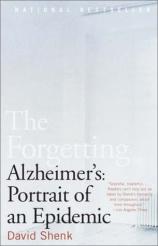The Forgetting: Alzheimer's: Portrait of an Epidemic
Review
The Forgetting: Alzheimer's: Portrait of an Epidemic
Just in case you don't have enough to worry about, consider Alzheimer's disease. Over five million Americans currently suffer from this degenerative disease that attacks the neurons in the brain, slowly erasing memory, verbal skills, motor skills and the basic elements of identity. It is lethal, incurable and only negligible treatments are available. Now think about the baby boomers, currently poised on the brink of the years when Alzheimer's disease begins to strike. Over the next fifty years, the number of Alzheimer's patients is expected to triple, resulting in a crushing burden on the medical community and on family caregivers, who may suffer more than anyone.
People are scared to read David Shenk's book. In his afterword, he refers to a family friend who bought it and intended to read it, but was too intimidated by the subject matter and its implications to delve into it. It's easy to understand why. If you already suffer from Alzheimer's, you may think it's too late to learn about it. If you don't have Alzheimer's and you don't know anyone who does, you might not want to learn any more about this terrible, merciless disease. However, as our population ages, it becomes increasingly likely that everyone will be touched by Alzheimer's --- as a patient, as a caregiver, or simply as a citizen of a world wherein a substantial segment of the population can no longer drive, dress themselves, speak rationally, recognize loved ones, or remember their own names. It is a social force as strong as any war --- and information and communication are our greatest weapons against it.
THE FORGETTING provides a brief history of the disease. Shenk describes Dr. Alois Alzheimer's first patient, a woman who suffered from what was believed to be inexplicably premature senility. He intersperses his accounts of ongoing research with anecdotes of famous people we now know to have had Alzheimer's disease, great minds that self-destructed inside otherwise healthy bodies. Ralph Waldo Emerson's decline was slow and sad. Jonathan Swift died bitter and thwarted by his waning skills. His last words were, "I am a fool."
Painter Willem de Kooning had a different experience. He kept painting, even though his mind was failing and produced some of the best works of his career. His story is a reminder that some Alzheimer's patients find a sort of peace through their disease. In letting go of ordinary habits and concerns, some patients reach a level of tranquility before their last decline.
The book also introduces us to the research community: an army of doctors, scientists, independent researchers and pharmaceutical companies who are working fiercely to find a cure before Alzheimer's disease overwhelms us. It is heartening to know that such an effort is in progress, although it's cruel to end Chapter 14 hinting that a vaccine has been found that will prevent Alzheimer's disease from ever developing and stop existing Alzheimer's disease from progressing, only to mention in the afterword that the vaccine never made it past FDA phase 2 trials. False hope is the last thing these people need.
David Shenk does not mean to be cruel; it's just that research is moving so quickly that the best prospect for a cure in the hardcover edition had already been scrapped by the time the paperback came out. Even so, there's a lot of good information here. Readers might find the Resources section in the back to be the most practical help and Chapter 16, "What Not to Do," lists behavior patterns that researchers (currently) find helpful in avoiding the disease.
Reviewed by Colleen Quinn on January 22, 2011
The Forgetting: Alzheimer's: Portrait of an Epidemic
- Publication Date: January 14, 2003
- Genres: Health, Nonfiction
- Paperback: 304 pages
- Publisher: Anchor
- ISBN-10: 0385498381
- ISBN-13: 9780385498388




